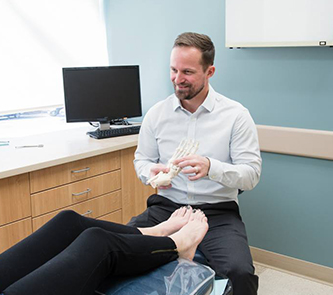Is That a Pebble in Your Shoe? (Nope. It’s a Neuroma in Your Foot!)
Have you ever felt like you were walking on a pebble or a fold in your sock, only to find your shoes pebble-free and your sock nice and smooth upon further inspection?
Or perhaps you are experiencing shooting pain in the ball of your foot or toes whenever standing or walking?
Well, you may have developed a condition called a neuroma!
The good news is that you are not going crazy – there’s a reason for that phantom sensation. The not-so-good news is that neuromas can be more than just painful. Not to mention, having a neuroma can easily keep you from being as active as you would like and can make even routine tasks much more difficult to accomplish.
But if you think you may have developed a neuroma, there’s no need to panic. This condition can often be treated using simple, conservative measures right here at either of our Northeast Foot and Ankle offices. With that said, timing is key for optimal recovery – so don’t wait to get the relief you need! Let us help you today.
And, in the meantime, let’s talk a little bit more about this annoying condition – what a neuroma really is, its causes, and how you can treat and prevent it.
Understanding Neuromas
Also referred to as a Morton’s neuroma or intermetatarsal neuroma, this condition often afflicts the area between the second and third or the third and fourth toes where a nerve passes under a ligament that holds forefoot bones together. Pressure or trauma in this area leads to swollen tissue pressing on the nerve, causing pain, tingling, numbness and burning sensations between the toes and in the ball of the foot.
One underlying reason that this may occur is structural issues, such as having flat feet or arches that are too high. When you have certain gait abnormalities, you are much more likely to also have instability in your toes. Neuromas can also develop due to ill-fitting footwear – shoes that are too tight or too small.
However, there are many other risk factors that may also contribute to this condition, including:
- If you have experienced trauma or damage to the nerves in the toe
- If you are on your feet all day at work, which puts more stress on your feet
- If you wear shoes that do not offer support or fit properly, such as high heels
Whether your neuroma developed due to trauma or ill-fitting shoes (or any other reason for that matter), your best course of action is to come visit us right away to get the relief you need. We have the best knowledge, skills, and tools available to get you back on your feet.
Which brings us to our next point: How to treat and prevent this condition from holding you back in the first place.

Treating and Preventing Neuromas
If you are experiencing pain caused by a neuroma, try these easy steps:
- Wear shoes that allow your toes to move freely
- Wear shoes with thick, shock-absorbent soles
- Consider wearing custom orthotics
- Avoid (whenever possible) shoes with heels more than two inches tall
- Rest the foot and massage the affected area whenever you feel pain
- Apply ice to the area after completing a gentle massage
- Use over-the-counter shoe pads
Now, if these conservative treatment methods just aren’t getting you enough relief from your symptoms, the best thing to do is see a medical professional who can help you nip the problem in the bud.
When you make an appointment, we will thoroughly evaluate your situation in order to create a unique treatment plan to address your specific needs and goals. Here are some of the most common treatments we use to treat neuromas:
- Activity modifications
- Injection therapy
- Shoe modifications
- Custom orthotics
- MLS or EPAT therapy
- Medication
- Surgery
We will exhaust all conservative measures available before considering surgery. Only when these measures have been unsuccessful, or if we determine that your condition is too severe to respond to non-invasive treatments, will we start discussing the possibility of surgery.
And if that ever becomes the case for you, then you can find peace of mind in knowing that our team of foot and ankle experts hold the knowledge, skills and tools available to get you back on your feet as quickly and as safely as possible.
So, don’t wait to get the relief you need today!
Let Us Help You
All you have to do is give us a call at (603) 431-6070 or schedule your appointment online for either our Portsmouth or Nashua office. But whatever you do, don’t wait until your condition becomes worse before seeking appropriate help. Addressing symptoms at its early stages could mean the difference between finding relief through simple, conservative treatment methods and needing surgery to repair the damage.
Pay Your Bill
Make a payment online through our payment portal or Care Credit!
Portsmouth Office
14 Manchester Square, Suite 250
Portsmouth, NH 03801
Nashua Office
17 Riverside Street, Suite 205
Nashua, NH 03062
Website Hosted by SC Digital



